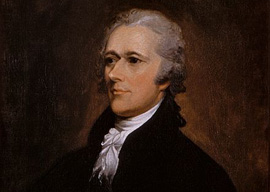
December 14, 2016

Alexander Hamilton by John Trumbull
(As everybody who has seen the expensive Hamilton musical seems to now know, Alexander Hamilton was a black immigrant free trader.)
In reality, of course, they were all protectionists.
Thus it’s particularly ironic that liberals attempting to recruit faithless members of the Electoral College to stage a coup against Trump on Dec. 19 are calling for “Hamilton Electors“ when Trump’s economic policy is Hamiltonian.
In 2016, even economists are finally admitting that outsourcing our manufacturing to China was bad for the American working class. In a new paper entitled “The China Shock: Learning from Labor-Market Adjustment to Large Changes in Trade,” economists David H. Autor, David Dorn, and Gordon H. Hanson document that America’s experience with China has not gone according to free-trade theory. The reality
…has challenged much of the received empirical wisdom about how labor markets adjust to trade shocks…. Adjustment in local labor markets is remarkably slow, with wages and labor-force participation rates remaining depressed and unemployment rates remaining elevated for at least a full decade after the China trade shock commences. Exposed workers experience greater job churning and reduced lifetime income. At the national level, employment has fallen in the US industries more exposed to import competition, as expected, but offsetting employment gains in other industries have yet to materialize.
At the end of the 1990s, as the Clinton administration gave the green light to American firms to shut down their plants and subcontract with China, I became intrigued by sci-fi author Jerry Pournelle’s compromise suggestion that Congress simply impose a 10 percent across-the-board tariff on all imports. This might be enough to make corporations at least think twice about laying Americans off. And a flat tariff would reduce the kind of political corruption that traditionally accompanied setting tariffs.
German chancellor Otto von Bismarck may (or may not) have said, “There are two things you don”t want to see being made”sausage and legislation.” But he certainly had opportunity to reflect upon that, having turned Germany away from free trade to tariffs in 1879.
But all these years later, the complexity of tariffs seems less like a bug than a feature.
Protectionism was a notorious moneymaker for the Republican Party because the politicians had so much control over the size of each tariff. If a Republican fund-raiser in 1888 told the buggy-whip manufacturers of America that they”re going to get only a 2 percent tariff while the domestic velocipede makers will benefit from a 40 percent tariff, they were apt to bargain.
The centrality of tariffs to the financial health of the businessman’s party was a key insight of Clay, Lincoln, and McKinley. Whether protectionism is good for the country or not, it tends to be good for the protectionist party because it gives their politicians something to sell.
Therefore, a GOP reorganized around the centrality of borders”immigration restrictionism and protectionism”is a party that could conceivably attract both the votes of the people and the contributions of the CEOs.